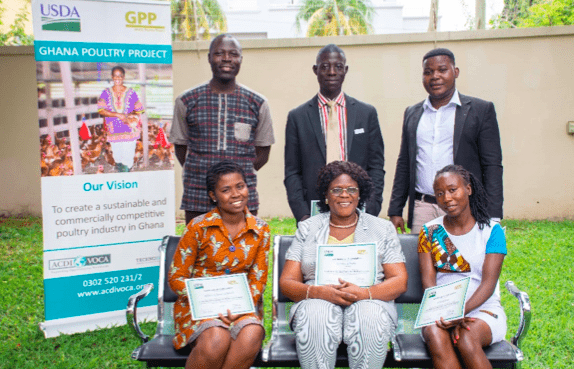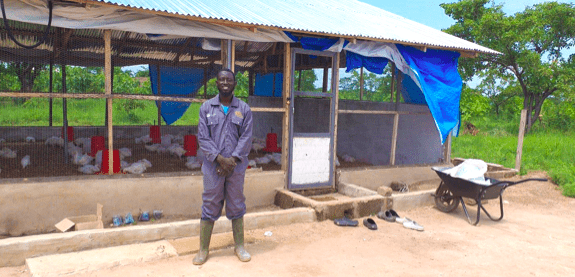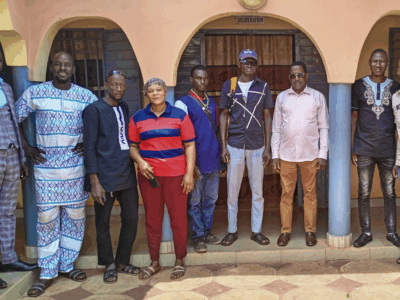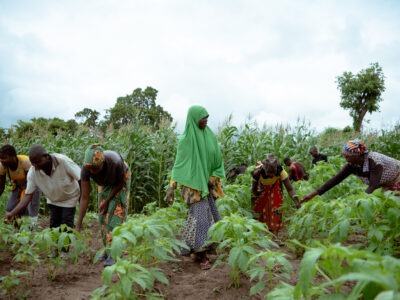
In Ghana, the agricultural sector holds great potential to catalyze economic growth and employment for young people, especially given the growing demand for food. Increasingly, young people are turning to agriculture as a viable job option – willing to engage in farming for profit rather than for subsistence.
The United States Department of Agriculture (USDA)’s Ghana Poultry Project (GPP), which we implement, helps young people access the training and information they need to engage in productive, profitable, and sustainable agribusiness in Ghana. Through GPP’s Youth Skills Development Program, 45 young people have gained valuable experiences in various segments of the poultry value chain, enabling them to practice improved farming methods and access markets more easily.
Youth Mentoring
GPP sees mentorship as a means to equip youth, especially young women, with the knowledge, skills, and networks they need to succeed as poultry entrepreneurs. Such opportunities create viable career pathways for youth in poultry, enhancing their chances of economic prosperity and the nation’s food security efforts. GPP’s Mentorship Program is designed to facilitate the successful mainstreaming of youth into the poultry value chain. It started in 2017 and develops young people into highly skilled, innovative, and committed agribusiness entrepreneurs.

Sadat, a mentee, constructed a 1,500-capacity broiler farm with his own funding after the program. He received input and equipment support through GPP’s grant.
Objectives
The mentorship program is designed to achieve GPP’s gender equity priorities, investing in the skills and knowledge of young women and men. It seeks to find ways to expand their access to resources so they can have more opportunities to succeed. Specifically, the program aims to achieve the following:
• Develop young peoples’ capacity to appreciate the value chain and the “business of poultry” for their full participation.
• Enhance their technical skills through on-farm and industrial training opportunities.
• Link youth to networks of leading poultry professionals for continued support and synergies.
• Create exposure to new ideas, techniques, and technology in the poultry industry.
Program Components
Duration
The program is implemented within six months per cohort across the three project regions. Mentees can either stay full time on a mentor’s farm or commute from home. Both mentee and mentor agree on the minimum number of hours to be spent on the farm weekly based on the mentee’s training needs.
Training Tracks
The program combines two training tracks 1) On-farm / Enterprise Training and 2) Academic and Business Development Training. Mentees are guided by their individual mentors, who are the managers or owners of the farm, through all aspects of their mentor’s operations in the field. Academic supervisors provide theoretical training in technique application and production to complement their field experience and simultaneously business development processes.
The Business Plan Competition
GPP makes initial investments to support successful mentees’ start-up businesses through grant funding. A mentee can qualify for this support through a competitive business pitching process conducted at the end of the program. Mentees must demonstrate an excellent understanding of their operational segments of choice and convince a panel of their market readiness.
Grant Support Package
A committee of GPP stakeholders and staff select the three best pitches per region after each mentorship program and GPP furnishes the winners with an in-kind grant. Through the grant, mentees are assisted to start their farms in (rented) pens to build their own resource and asset base over time. The grant enables mentees to procure basic equipment, inputs, and set up their brands and meet regulatory requirements. GPP and the mentors provided additional technical support in the start-up phase.
Mentorship Program Benefits
The learning and practical experiences gained through the program help mentees avoid common mistakes as new entrants. Through training, they can better deal with key business growth challenges such as productivity, market standards, and market access. Mentees can also reach out to their mentors and technical supervisors after the mentoring period for further guidance. This provides them the needed confidence for their businesses to thrive. Successful mentees also access GPP’s grant funding, which so far accounts for the establishment of 20 new poultry enterprises by 26 mentees. Two mentees were employed as Farm Managers at the farms where they were trained.
Learn more about GPP here.
Learn more about our work in Ghana here.








